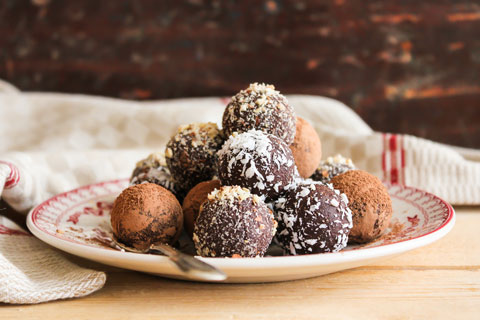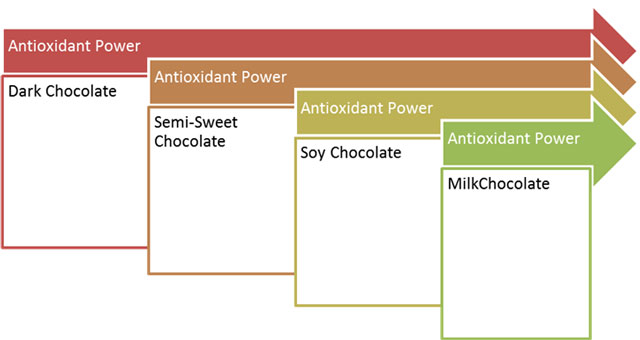Can Chocolate Help Prevent Cancer?

Want to give the gift of love this Valentine's Day or any holiday? Consider giving chocolate - especially dark chocolate. What better way to say "I love you" than contributing to your loved one's good health?
Foods high in polyphenol compounds have been linked to health benefits, including preventing certain types of cancer. (i.275)
Chocolate contains many polyphenol compounds that have anticancer properties, including: (i.275-277)
Did You Know?
Chocolate is made from the beans of cocoa trees (Theobroma cacao). Also known as cacao, wild cocoa trees are originally from South America. They were grown in Central America and Mexico by migrating Indians, and were actually cultivated by the Maya over 1500 years ago. (i.276)
- Beta-sitosterol
- Catechins
- Epicatechins
- Flavonoids
- Procyanidins
In fact, tests show that natural cocoa powder and dark chocolate have significantly more beneficial polyphenols and antioxidant power than other super foods, including: (i.278)
Evidence of Chocolate's Cancer Fighting Benefits
Lab and animal research, as well as some clinical studies, show dark chocolate has the following cancer-fighting effects:
| Cancer Type | Chocolate Cancer Fighting Benefits |
|---|---|
|
(lab tests) |
|
|
(lab and animal studies) |
|
|
(lab studies) |
|
|
(lab studies) |
|
|
(lab and animal studies) |
|
|
(lab tests) |
|
Eating dark chocolate may also help improve quality of life in patients with cancer. In a clinical study, 133 cancer patients from 3 different hospitals were randomly assigned to eat 50 g/day of dark chocolate or mineral water for 3 consecutive days. Those who ate chocolate had significantly reduced depression and anxiety. (i.287)
Other Health Benefits of Chocolate
| Health Condition, Concern, or Disease | Evidence of Benefit |
|---|---|
|
Although 12 weeks of eating high-antioxidant chocolate didn't reduce skin sensitivity to UV radiation from the sun. A limit of the randomized clinical trial was none of the 74 participants were assigned to not eat chocolate. Instead, they were randomly assigned to eat either chocolate high in antioxidants or low-antioxidant chocolate. (i.288) Interestingly, the study found that chocolate may help protect skin from photo-aging. In the clinical trial, participants who ate chocolate showed a small but significant increase in elasticity in the skin at the temple. (i.288) In a different 24 week clinical trial, dietary supplements of cocoa compounds improved facial wrinkles and elasticity. The women participating in the study were between the ages of 43 and 86 years old, and all had moderately aged skin. (i.289) |
|
|
Data from population studies suggests that eating chocolate 2-6 times per week could decrease the risk of developing diabetes in healthy people. Research shows that chocolate compounds increase insulin sensitivity. (i.290) |
|
|
Heart disease and stroke |
According to a prospective population study, eating more chocolate is linked to lower risk of cardiovascular disease and stroke. Higher chocolate consumption is also linked to fewer adverse outcomes from heart disease, including lower rates of mortality. (i.291) Analysis of other prospective studies support chocolate's healthy heart effects. Data from 6 studies involving tens of thousands of adults and thousands of cases of heart disease found eating chocolate is linked to lower risk of heart attack and stroke. (i.292) |
|
If you have hypertension and diabetes, eating chocolate could lower your blood pressure - as long as it's dark chocolate. In an 8 week clinical trial, patients assigned to dark chocolate showed significant decreases in both systolic and diastolic blood pressure. However, those who ate white chocolate showed no differences in blood pressure by the end of the study. (i.293) |
|
|
Research in animals suggests cocoa could help reduce liver damage and fibrosis. In turn, this could lower the risk of liver cancer. (i.294) |
|
|
Sports training |
In a small clinical study, milk chocolate reduced muscle soreness and improved performance better than water. (i.295) |
Best Type of Chocolate for Health Benefits
Lab, animal, and clinical studies show the darker the chocolate the better. Why? Dark chocolate contains more of the beneficial cocoa compounds and antioxidants than semisweet, milk, or soy chocolate. (i.296)

Antioxidant Levels in Chocolate
You may also want to choose chocolate that is made from non-fermented (raw) cocoa beans. Research shows that roasting and fermenting cocoa beans can affect antioxidants in chocolate — especially levels of epicatechin and catechin antioxidants. Compared to unripe, unprocessed cocoa beans, different chocolate processing techniques showed the following effects: (i.278, 281, 297)
| Processing Technique | Epicatechin Levels | Catechin Levels |
|---|---|---|
|
Ripening |
↑ |
No change |
|
Drying |
Minimal change |
Minimal change |
|
Fermentation |
↓ |
↓ |
|
Roasting |
↓ (over 158° F) |
↑ (over 248° F) |
|
Dutch processing |
↓ |
↓ |
Natural cocoa is also acidic. Chocolate makers often treat it with a basic substance to lower that acidity. This alkalizing process is often referred to "dutching," and Dutch cocoa has a more mellow taste. However, industry tests show that chocolate products, including hot cocoa mixes, made with alkalized cocoa are comparatively lower in antioxidant and polyphenol levels. (i.278, 281)

